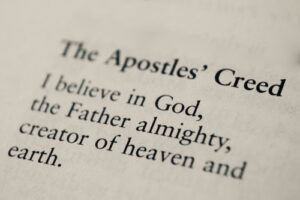
The different facets of the Christian life are designed to overlap. As we look at the various things Christians believe and do, it’s wise to think of them as part of a whole – part of a life of discipleship – not different aspects that stand alone. Pastoral care is no exception to that rule. Most of us will probably agree that our personal quiet times are meant to impact our heart, preaching is designed to impact every aspect of our lives, evangelism is designed to have a pastoral component – small groups, 1-to1s and practical service too. But, what about liturgy? Does that have a role in pastoral care?
It’s probably fair to say that some of us are part of more liturgical churches than others. Some of us will use set words as we take the Lord’s Supper – others of us are used to a much more fluid order of service. All of us, however, will be at least a little familiar with saying the Lord’s Prayer, reciting a creed, singing songs or hymns alongside our brothers and sisters or corporately reading set prayers – be they denominational norms or the home-grown preferences of our local congregation.
Some Christians are far fonder of liturgy than others. And engagement with liturgy is an area of freedom for those who are in Christ. But it’s worth thinking just how helpful engagement can be for those who are finding life hard – whether that’s corporately when the church is gathered, in a pastoral conversation or quietly on our own.
Liturgy, when faithfully infused with Scripture:
- Gives us words when we have none of our own: Many who struggle know that praying can be hard. There are days when the words just don’t flow. Reading good, faithful prayers, written by others, can be just what we need to express our desires and the things we would like God to help us desire too.
- Gives us a structure to spur us on: Some routine can be dull and lifeless but other habits are lifelines in times of trial. How many Christians have benefited from just keeping going with their engagement with God, even when they don’t feel it? Liturgy can help us persevere when our hearts are cold.
- Enables profound truths to become familiar: It’s common in times of trial for us to forget that God is good, to lose sight of his purposes and plans. Our problems feel big and his sovereignty, small. Faithful liturgy can point us to the big story of the Bible, remind us of who God is. And doing that regularly, can help keep his character and work clearly in view.
- Helps those same truths stir our heart: Saying exciting truths together (be that as a whole congregation or just in a two) helps us feel the impact of those truths more deeply. Love, trust, hope and similar Christian calls have a felt not just a cognitive component and, whilst we want to avoid emotionalism, saying or singing things together in ways that encourage emotional engagement is good.
- Helps struggling believers turn towards God: At the heart of worship, is the discipline of turning towards God. That has many dimensions: praise, repentance, lament to name just three. Liturgy can help us to engage with God in a variety of postures, not missing out the ones that we might avoid if left on our own.
- Reminds us we are part of a community: As we say words together – or say words that we know many others have said – it can bring the unity of the Christian church sharply into view. We are not struggling alone, we are part of a family and one that shares our joys and pain.
There are other benefits besides: the correction of the false beliefs that can plague our old self might be another area to explore. As long as we don’t allow liturgy to become dry, hollow repetition, there are good reasons to engage.
So, if you lead corporate worship on a Sunday, why not draw out the pastoral implications of any liturgy (however small) you might use? If you lead a small group midweek, why not occasionally say a creed or a collect or sing a hymn to focus the unity and understanding of your group? If you are meeting with someone who is hurting, why not have a set prayer that you say together at the beginning or the end – for a season at least – one that really points to what you are aiming at in your conversations when you meet? If you are struggling right now, why not pray the Lord’s prayer or speak out the creed to remind you just how good God is?
Doing so isn’t essential but it can be deeply helpful. And, even as someone who doesn’t use liturgy very often, I’m going off right now to try…